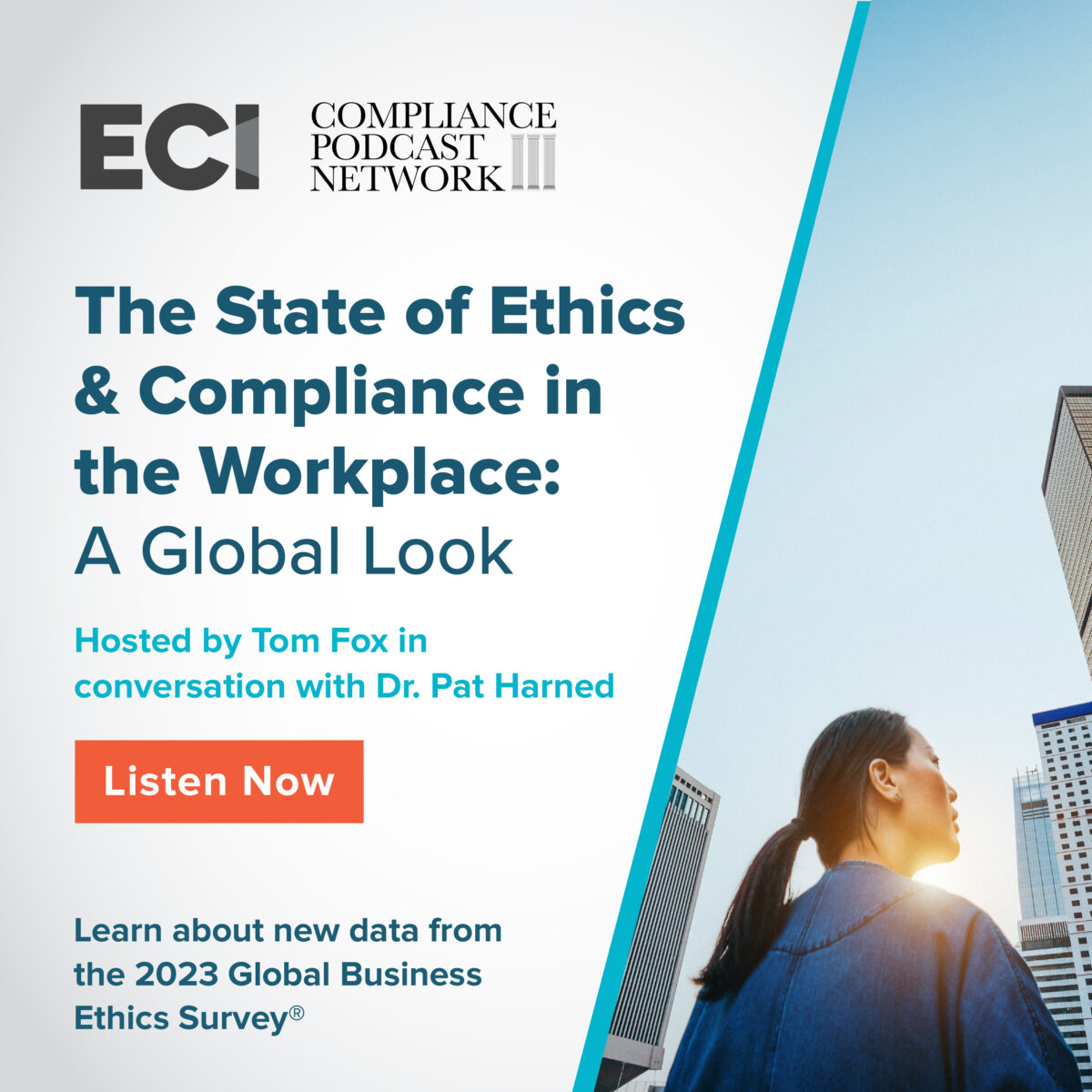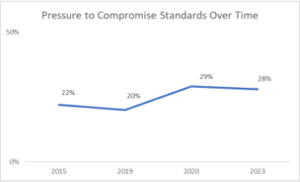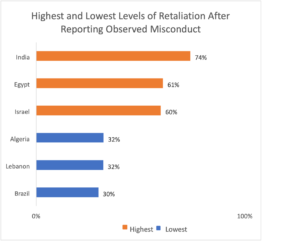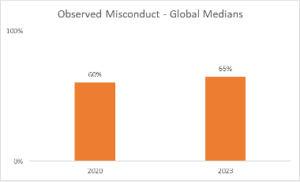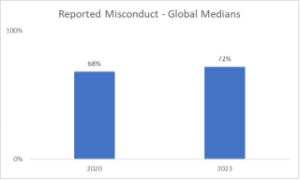The Global Business Ethics Survey (GBES) conducted by the Ethics & Compliance Initiative (ECI) provides valuable insights into workplace ethics and compliance from the perspective of employees. I recently had the opportunity to visit with ECI CEO Pat Harned on the 2023 GBES. This survey has become a reliable benchmark for organizations to compare their workplace culture with third-party research, allowing them to identify areas for improvement and address potential risks.
Over the past 30 years of GBES research, ECI has identified and proven that certain “outcome” metrics are indicative of the well-being of workplaces from an ethics & compliance perspective. In this, the largest and latest update to the GBES body of research, employees in 42 countries around the world told us that there is reason for concern. In Part 1 of a five-part blog post series on the 2023 GBES, we provide an overview of the GBES.
The 2023 GBES reveals concerning trends that highlight the need for organizations to prioritize ethics and compliance. The GBES stated:
The following are the critical measures of “the state of ethics & compliance in the workplace”:
- Pressure in the workplace to compromise ethical standards;
- Observations of misconduct by employees as they go about their day-to-day work;
- The reporting of misconduct when observed;
- Any retaliation perceived by employees after they report misconduct and
- Strength of workplace culture from an ethics & compliance perspective.
These findings are particularly alarming, as they indicate that unless businesses change their approach to ethics and compliance, the situation is likely to worsen.
The GBES is a longitudinal cross-sectional study, meaning that it has been conducted over a long period, but the survey participants change with each iteration. This methodology ensures a diverse and representative sample, making the survey results highly reliable. By gathering input from employees, the GBES provides a comprehensive understanding of workplace culture and allows organizations to measure the impact of their ethics and compliance programs.
Pat Harned emphasized the importance of employee input in measuring the effectiveness of ethics and compliance programs. The GBES enables organizations to understand what employees are seeing and how they perceive the culture within the workplace. This information is crucial for organizations to make informed decisions and improve their ethics and compliance programs.
The GBES report offers valuable data and benchmarks for compliance professionals, regulators, and business leaders. It provides insights into key metrics that can help organizations assess the quality of their ethics and compliance programs. The report also highlights major risk areas identified by employees, allowing organizations to prioritize their efforts and address potential issues.
One of the key takeaways from the GBES is the importance of a high-quality ethics and compliance program. The report indicates that many organizations are not focusing enough on implementing effective programs that can make a difference. This insight is relevant to various stakeholders in the compliance community, including compliance professionals, regulators, and providers. The GBES report can help these stakeholders understand what a high-quality program looks like and identify areas for improvement.
The GBES report also offers suggestions for leaders to strengthen their ethical cultures and encourage more employee reporting. By understanding the factors that influence employees’ perceptions of ethics in the workplace, organizations can take proactive steps to create a positive and ethical work environment.
To access the 2023 GBES report and obtain more information about ECI, interested individuals can visit the organization’s website at www.ethics.org. The report provides a summary of the findings, while an interactive website allows users to explore the data in more detail.
Taken together, the main findings in this GBES clearly portend that businesses today face a higher risk of misconduct and loss of public trust than ever before. From the GBES:
- When employees say that they face pressure to compromise standards, they are more likely to observe misconduct. Pressure is at an all-time high.
- Employees are already working in environments where wrongdoing can occur. Misconduct is at an all-time high.
- While more employees are willing to report misconduct that they observe, the likelihood that they will experience retaliation is as high as ever. Retaliation has a silencing effect on an organization, and it occurs with alarming frequency.
- Most employees say that their workplace culture permits unethical conduct.
- Companies are not undertaking the most important effort that can reduce their risk for future problems, namely implementing a high-quality program.
Presently, business is one of the most trusted sectors among members of the public around the world. However, all current indications point to rampant risk for misconduct to occur. Should this take place, these organizations will not only lose the trust of their employees but that of consumers and stakeholders. Unless major changes occur, public trust in business can and will be lost.
In conclusion, the Global Business Ethics Survey provides valuable insights into workplace ethics and compliance. The latest report highlights concerning trends that organizations need to address to improve their ethics and compliance programs. By utilizing the data and benchmarks provided by the GBES, compliance professionals, regulators, and business leaders can make informed decisions and work towards creating a strong ethical culture in the workplace.
To access the 2023 GBES report and obtain more information about ECI, interested individuals can visit the organization’s website at www.ethics.org. The report provides a summary of the findings, while an interactive website allows users to explore the data in more detail.
Join us in Part 2, where we consider the findings of the observation of workplace misconduct.
For more information, check out the ECI podcast series with Pat Harned discussing the GBES here.


